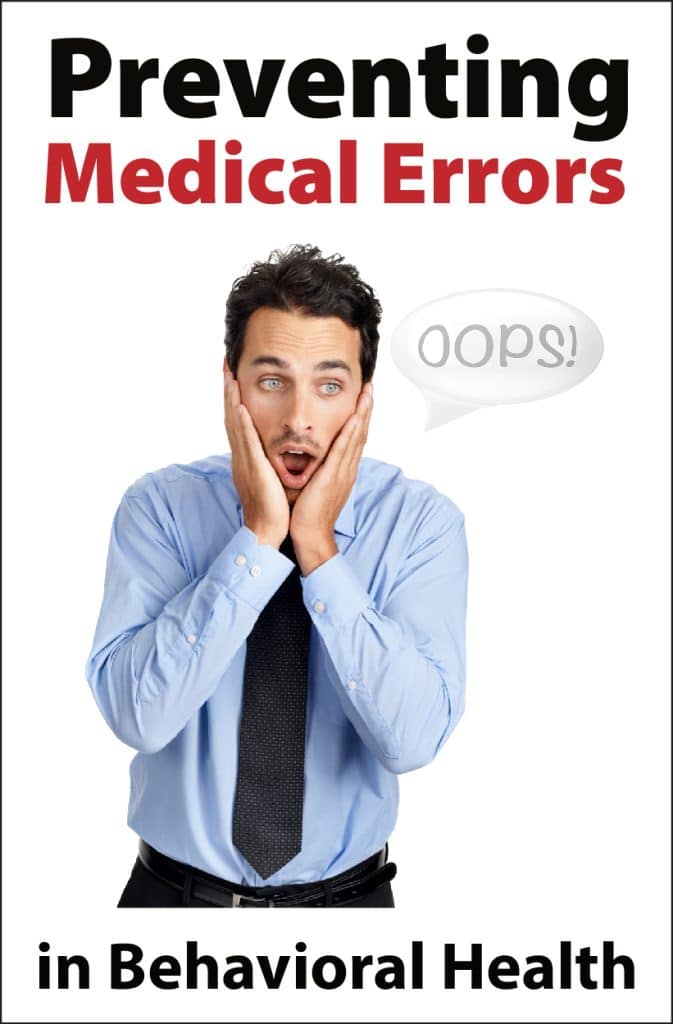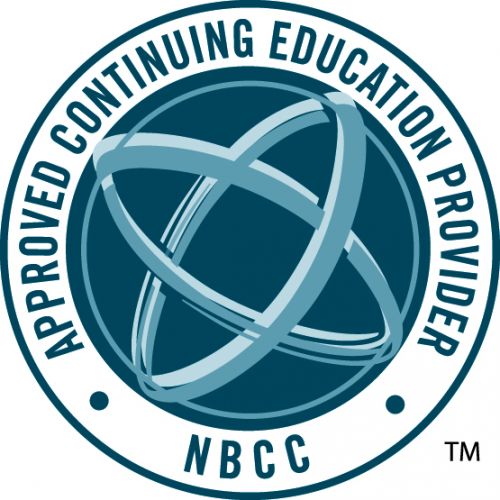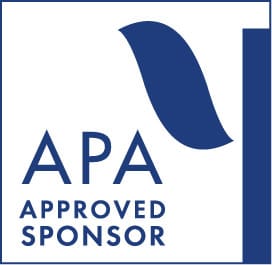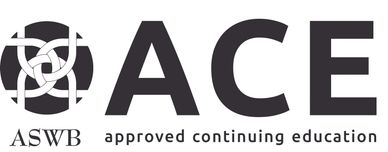Preventing Medical Errors in Behavioral Health
Leo Christie, PhD
$29.00
 Learning Level : Intermediate
Learning Level : Intermediate
 Online
Online
Course Abstract
Preventing Medical Errors in Behavioral Health is a 2-hour online continuing education (CE) course that offers strategies for avoiding medical errors in mental health practice.
This course is intended to increase clinicians’ awareness of the many types of errors that can occur within mental health practice, how such errors damage clients, and numerous ways they can be prevented. Its emphasis is on areas within mental health practice that carry the potential for “medical” errors.
Examples include improper diagnosis, breaches of privacy and confidentiality, mandatory reporting requirements, managing dangerous clients, boundary violations and sexual misconduct, the informed consent process, and clinical and cultural competency. Most errors arise from inadequate attention to the various educational, clinical, ethical, and legal resources available. This course will illustrate the kinds of “medical” errors that can occur in psychotherapy practice and will offer strategies for avoiding them.
Also included are sections on psychotherapy in the digital age, including the use of social networking platforms, the challenges of maintaining and transmitting electronic records, email, text messaging, the use of smart phones, engaging in the practice of teletherapy, and the use of Artificial Intelligence (AI) in practice.
* This course satisfies the medical errors requirement for license renewal of Florida mental health professionals.
Course #21-60 | 2024 | 40 pages | 15 posttest questions
Learning Objectives
- List three ways in which clients may be harmed by receiving an improper diagnosis
- Identify two exceptions to confidentiality and privileged communications
- Describe two examples of situations that warrant mandatory reporting
- Distinguish between boundary “crossings” and boundary “violations”
- Specify three issues therapists need to consider before using social networking platforms
- Name at least four guidelines to be observed in offering teletherapy services
Course Directions
This online course provides instant access to the course materials (PDF download) and CE test. The course is text-based (reading) and the CE test is open-book (you can print the test to mark your answers on it while reading the course document).
Successful completion of this course involves passing an online test (80% required, 3 chances to take) and we ask that you also complete a brief course evaluation.
About the Author(s)
Leo Christie, PhD, LMFT : Find out More
Leo Christie, PhD, LMFT, is a Florida-licensed Marriage and Family Therapist with a doctorate in Marriage and Family Therapy from Florida State University. Past President of the Florida Council on Family Relations, Dr. Christie has more than 20 years’ experience in private practice with a specialty in child behavior disorders and as an instructor for over 500 live continuing education seminars for healthcare professionals. He is the founder of Professional Development Resources; a nonprofit corporation whose mission is to deliver continuing education credit courses to healthcare professionals throughout the United States.
Disclosure
Financial: Receives a salary from Professional Development Resources, Inc.
Nonfinancial: No relevant nonfinancial relationships exist.
CE Information
Counseling

Professional Development Resources (PDR) has been approved by the National Board for Certified Counselors (NBCC) as an Approved Continuing Education Provider, ACEP No. 5590. Programs that do not qualify for NBCC credit are clearly identified. PDR is solely responsible for all aspects of the programs. Professional Development Resources is also approved as a provider of online (home study) continuing education by the Florida Board of Clinical Social Work, Marriage & Family Therapy, and Mental Health Counseling (#50-1635); the New York State Education Department’s State Board for Mental Health Practitioners as an approved provider of continuing education for licensed mental health counselors (#MHC-0135 - Note: New York counselors will receive 2 continuing education credits for completing this self-study course); the South Carolina Board of Professional Counselors and Marriage & Family Therapists (#193); and is CE Broker compliant (#50-1635 – completions are reported next business day, currently reporting for 46 boards).
Marriage and Family Therapy

Professional Development Resources is approved by the American Psychological Association (APA) to sponsor continuing education for psychologists. Professional Development Resources maintains responsibility for this program and its content. Professional Development Resources is also approved by the National Board of Certified Counselors (NBCC ACEP #5590); the Association of Social Work Boards (ASWB #1046, ACE Program); the Florida Board of Clinical Social Work, Marriage & Family Therapy, and Mental Health Counseling (#50-1635); the New York State Education Department's State Board for Mental Health Practitioners as an approved provider of continuing education for licensed marriage and family therapists (#MFT-0100 - Note: New York MFTs will receive 2 continuing education credit(s) for completing this self-study course); the South Carolina Board of Professional Counselors and Marriage & Family Therapists (#193); the Texas Board of Examiners of Marriage and Family Therapists (#114); and is CE Broker compliant (#50-1635 – completions are reported next business day, currently reporting for 46 boards).
Psychology

Professional Development Resources is approved by the American Psychological Association (APA) to sponsor continuing education for psychologists. Professional Development Resources maintains responsibility for this program and its content. Professional Development Resources is also approved by the Florida Board of Psychology (50-1635); the New York State Education Department’s State Board for Psychology as an approved provider of self-study continuing education for licensed psychologists (#PSY-0145); and is CE Broker compliant (#50-1635 – completions are reported next business day, currently reporting for 46 boards).
School Psychology

Professional Development Resources is approved by the American Psychological Association (APA) to sponsor continuing education for psychologists. Professional Development Resources maintains responsibility for this program and its content. Professional Development Resources is also approved by the Florida Office of School Psychology (50-1635); the New York State Education Department’s State Board for Psychology as an approved provider of continuing education for licensed psychologists (#PSY-0145); and is CE Broker compliant (#50-1635 – completions are reported next business day, currently reporting for 46 boards).
Social Work

Professional Development Resources, #1046, is approved as an ACE provider to offer social work continuing education by the Association of Social Work Boards (ASWB) Approved Continuing Education (ACE) program. Regulatory boards are the final authority on courses accepted for continuing education credit. ACE provider approval period: 6/12/2025 - 6/12/2028. Social workers completing this course receive 2 clinical continuing education credits. ACE format: Reading-based asynchronous distance learning.
Professional Development Resources is also approved by the Florida Board of Clinical Social Work, Marriage & Family Therapy, and Mental Health Counseling (#BAP346); the New York State Education Department's State Board for Social Work as an approved provider of continuing education for licensed social workers (#SW-0664 - Note: New York social workers will receive 2 continuing education credit(s) for completing this self-study course); the Texas State Board of Social Worker Examiners (#5678); and is CE Broker compliant (#50-1635 – completions are reported next business day, currently reporting for 46 boards).
Customer Testimonials
Very informative, especially the information regarding the use of technology.
Glad that an AI section was added to this topic of the course.
Excellent information. Very useful and helpful.
Very good, relevant, and up to date!
Very concise and useful.
More Testimonials
I thought this was well done, especially with all of the changes in our field since the pandemic.
I especially like the real-life Board complaints and what the issues were and how the sanctions were arrived at. Great job.
I always dread the Medical Errors CE courses because they can be so dry! Not so with this course. It was well-written, engaging and current. I especially liked the information on telepsychology. Thank you!
A good reminder, to keep these topics at the front of our awareness.
I particularly enjoyed the multidisciplinary richness of contributions from all licensed mental health professions. Thank you for a comprehensive course.
- ADHD
- Adults
- Alternative Medicine
- Alzheimers & Aging
- Animal-Assisted Therapy
- Autism
- Behavior Therapy
- Child & Adolescent
- Closeout
- Communication
- Couples-Family-Parenting
- Cultural Diversity
- Depression & Anxiety
- Domestic Violence
- Ethics & Risk Management
- Gender Identity
- HIV-AIDS
- Human Trafficking
- Laws & Rules
- Medical Errors
- Mindfulness & Yoga
- National Psychologist
- Nutrition & Fitness
- Psychotherapy
- Sexuality
- Substance Abuse
- Suicide
- Supervision
- Trauma & PTSD




